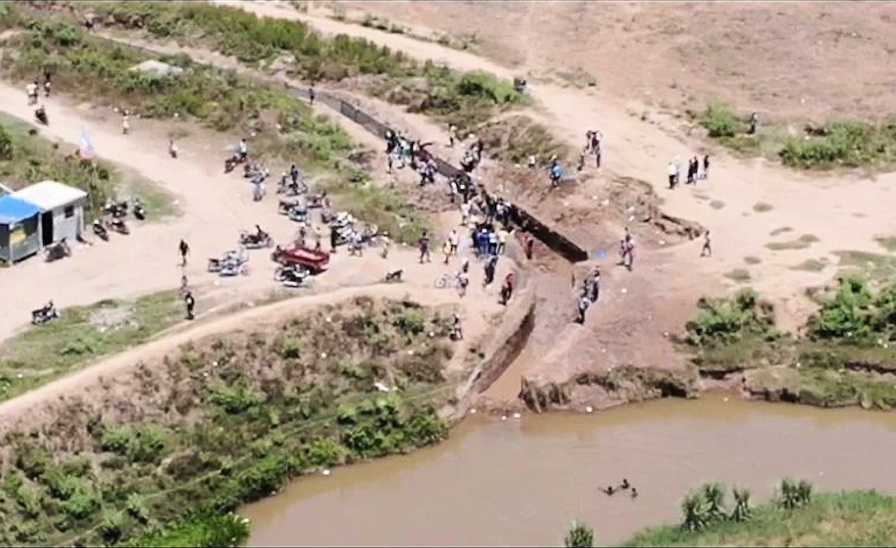
Drone shot of canal being built to use water from the Massacre River to irrigate land on the Maribaroux Plain. Photo: Haïti Liberté.

Orinoco Tribune – News and opinion pieces about Venezuela and beyond
From Venezuela and made by Venezuelan Chavistas

Drone shot of canal being built to use water from the Massacre River to irrigate land on the Maribaroux Plain. Photo: Haïti Liberté.
By Marie Laurette Numa -Sep 13, 2023
Water is the most basic of all resources,” writes Temple University professor, Dr. Nathan W. Snyder. “Civilizations grew or withered depending on its availability.”
Some of history’s greatest injustices stem from the struggle for water. For example, today, Israel has destroyed dozens of Palestinian villages only to replace them with illegal Israeli settlements. Every one of these illegal Israeli settlements is constructed on a vital water spring. “As Israeli settlements thrive, Palestinian taps run dry” is the headline of an Aug. 17, 2023 AP article that explains how “water troubles have stalked Palestinian towns and cities” because “Israel control[s] over 80% of the West Bank’s water reserves — and most other aspects of Palestinian life.”
In the same way that Israel is depriving Palestinians access to water on their own land, now the Dominican government is trying to deny Haitians their right to use water from the Massacre River, which forms the northern border between the two nations, to irrigate Haitian farmland.
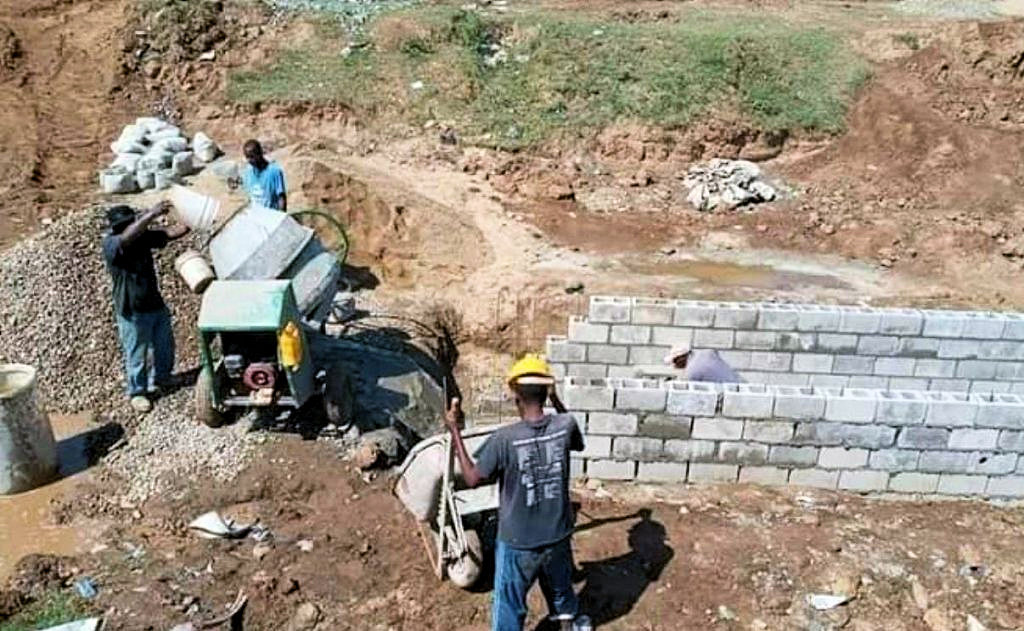
While in the Haitian capital, bourgeois politicians are consumed in demagogic negotiations for power sharing, on Haiti’s northeast border, Haitians are engaged in a merciless struggle for their sovereignty against the racist administration of the Dominican Republic’s President Luis Abinader.
The Haitian masses, particularly in Ouanaminthe, want to set an example worthy of our ancestors. Construction of a canal diverting some water from the Massacre River to irrigate agricultural lands in Haiti’s Northeast Department began in earnest in April 2021 under President Jovenel Moïse, but it abruptly stopped following his Jul. 7, 2021 assassination.
Over two years later, the de facto government of Prime Minister Ariel Henry has done nothing to resurrect the Massacre River irrigation canal project. So farmers in the Northeast banded together to restart the project with their own efforts and resources, since it is an absolute priority for them.
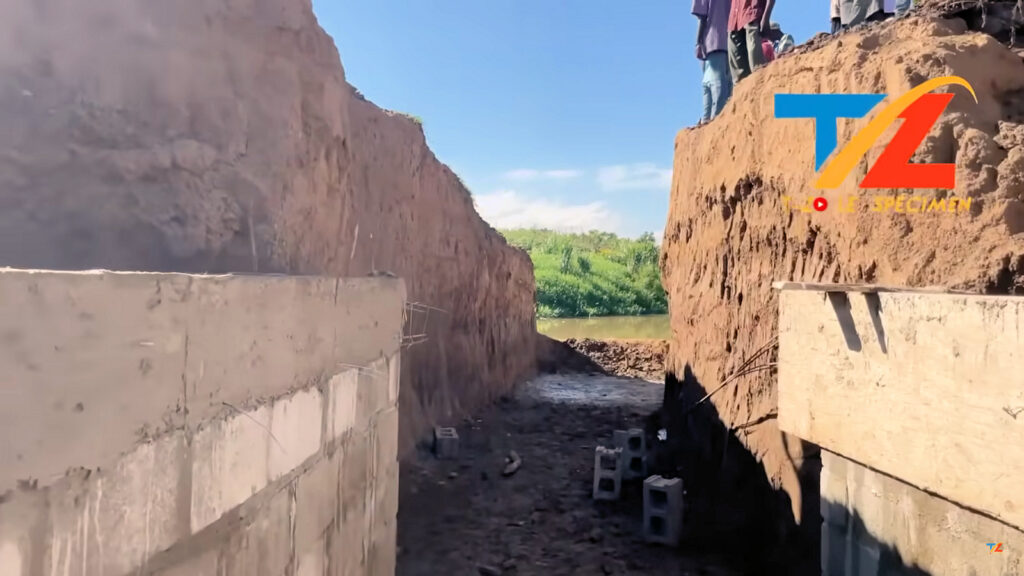
However, the project does not please the Dominican president. Since its launch, he has demanded that Haitian authorities stop the process.
In an interview published by the Dominican newspaper El Nuevo Diario on Jun. 10, 2021, Abinader insisted on the need for a mutual agreement to resolve the controversy around the construction of an irrigation canal into Haitian territory from the Massacre River, “which originates mainly in the Dominican Republic, without the consent of the Dominican Government. This is simply unacceptable to us.” He described this action by Haitian leaders as “arbitrary” and “unilateral.” Then he arrogantly said: “First, we want them to stop the construction of the canal, and then we can discuss a combined and effective management of the border’s water resources. But they must stop the construction of the canal. That is our demand.”
In 2021, the Haitian Ministry of Agriculture, Natural Resources and Rural Development (MARNDR) and President Jovenel Moïse took no notice nor seemed to give any importance to Abinader’s rants.
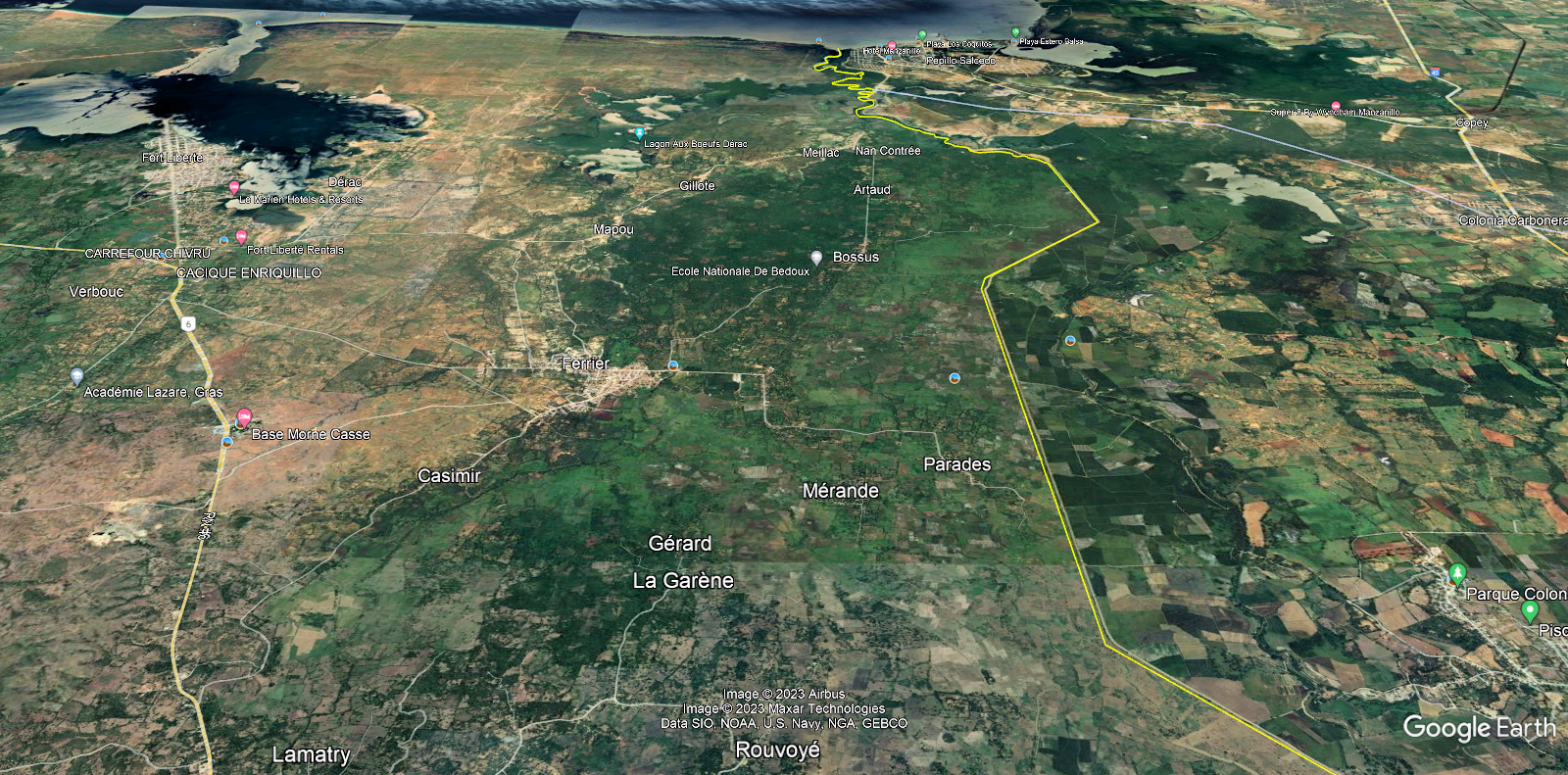
However, on May 24, 2021, during the inauguration in Quito of Ecuadorian President Guillermo Lasso, Presidents Luis Abinader and Jovenel Moïse discussed the river issue. Moïse declared on Twitter that the two leaders had agreed “not to fall into the game of the Dominican and Haitian ultra-nationalists and to continue to work for the happiness of the two peoples.”
Three days later, there concluded on May 27, 2021 a meeting of the “Dominican-Haitian Bilateral Joint Commission,” which was held at the Dominican Chancellery in Santo Domingo with a view to taking stock of the construction in Haiti of a canal from the Massacre River to irrigate more than 7,400 acres of land on the Maribaroux Plain near Ferrier.
Then-Prime Minister Claude Joseph made the following statement at the meeting’s start: “My presence at the opening ceremony of this technical meeting […] signifies the determination of the Haiti’s Government to prevent a misunderstanding which seems to arise in the management and use of the waters from the Massacre River, a latent conflict between the populations of the border zone […] The objective of the meeting is precisely to explore the ways and means to dissipate any misunderstanding about the real scope and purpose of the irrigation project that the Haitian Government is carrying out on the Massacre River (our emphasis) […] It is time for the two countries to agree on a comprehensive framework for the management of shared hydraulic resources, not only in Ouanaminthe / Dajabón, but in all other points of the land border.”
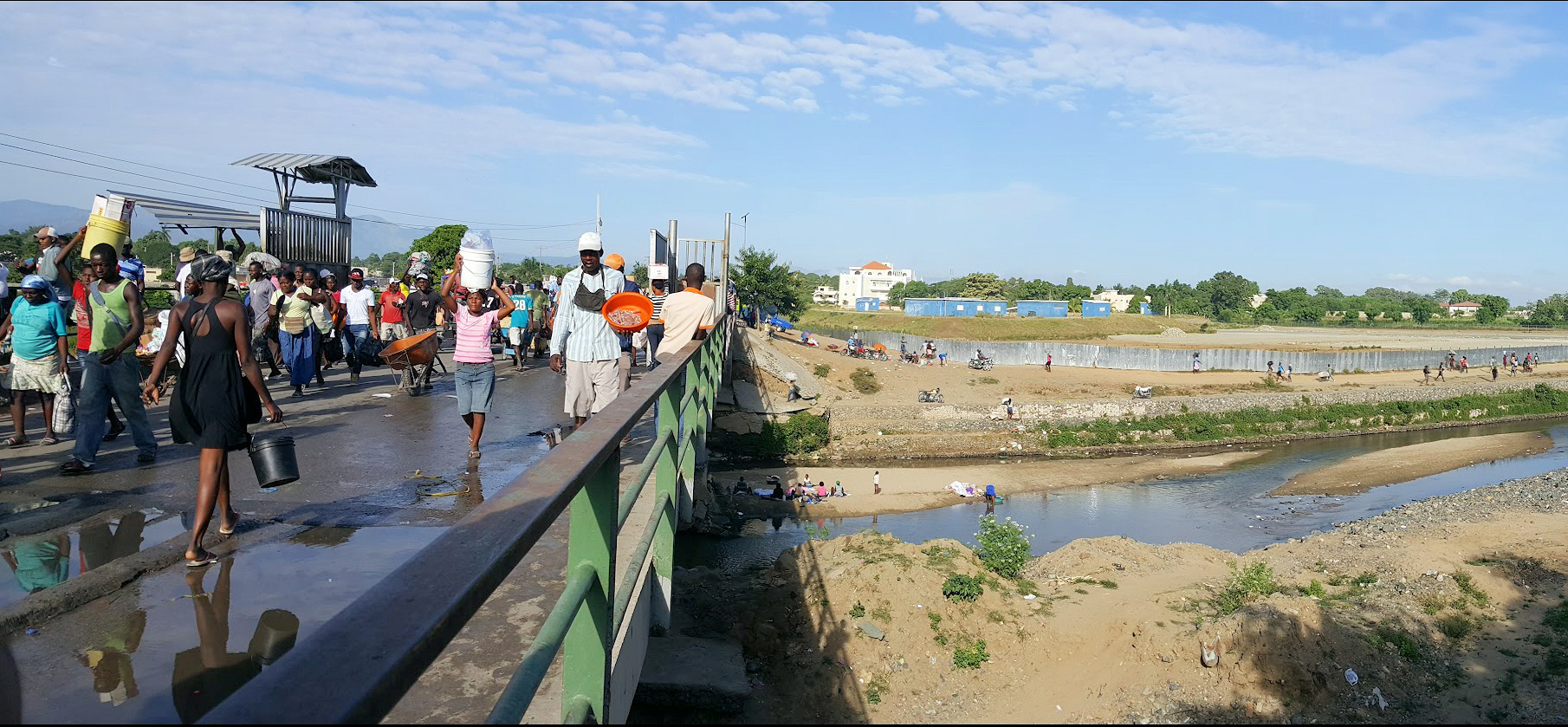
At the end of this meeting, a joint declaration was signed where the two nations committed to creating a “Technical Table” for a better understanding of the work carried out in the border area.
The May 27, 2021 meeting recognized that the “Treaty of Peace, Perpetual Friendship and Arbitration” signed on Feb. 20, 1929 between Haiti and the Dominican Republic “established the right of the two nations to use the waters of the rivers that are in the border area in a fair and equitable manner. (our emphasis)” It also recognized “that the work being carried out on the Massacre or Dajabón River for water capture does not consist of a diversion of the watercourse (our emphasis)” and therefore the two sides agreed to “continue to exchange information relating to all hydraulic works carried out or to be carried out in the border area” and to “create a Technical Table for a better understanding of the work carried out in the border area” as well as “a technical protocol for the coordinated management of cross-border watersheds, to guarantee the management of resources jointly.”
Two days later, on May 29, 2021, to everyone’s astonishment, President Abinader, while inaugurating a health center in Jarabacoa, said: “I am surprised by the opinions of certain media and some people who think there was an endorsement of Haiti’s work on the Massacre River. The only thing that was approved in this Commission was the creation of a technical table, which will discuss the use of all water resources of the border […] according to what the 1929 treaty indicates […] so that there are no conflicts today or tomorrow or later.”
Abinader apparently never read the 1929 Treaty between Haiti and the Dominican Republic. He thought he had to give permission to Haiti to use Massacre River water for irrigation of its lands.
In fact, Article 10 of the 1929 Treaty explains that both countries have the “right to use in a just and equitable manner, within the limits of their respective territories, the said rivers and other watercourses for the irrigation of land and other agricultural and industrial purposes.”
And according to Haitian residents, quoted by Le Nouvelliste, “it is high time to carry out such a work… [because] the Dominicans already have made several diversions from the river, while this is not yet the case for Haitians.”
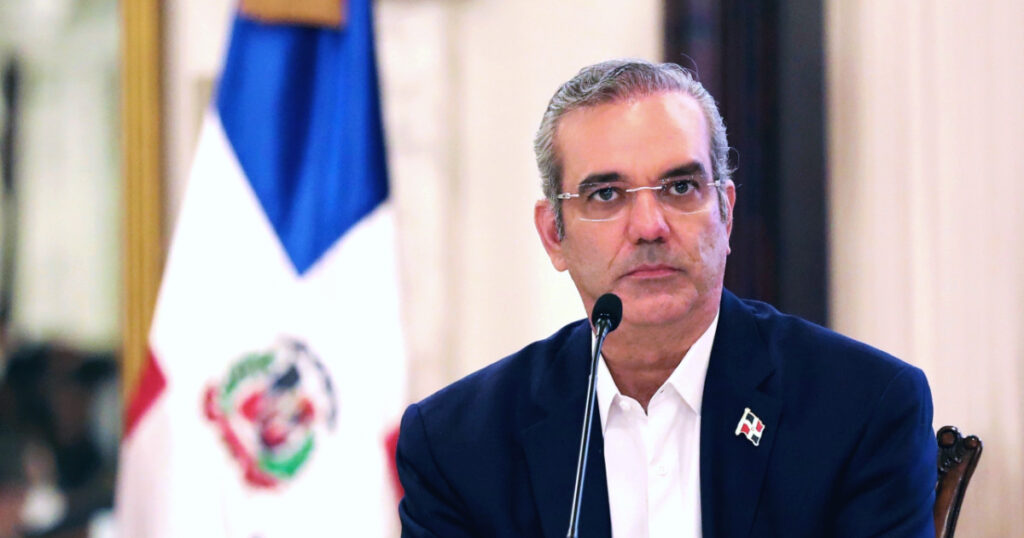
Enraged, Abinader renewed his offensive with a note from the Foreign Ministry saying that “the Dominican Government has firmly asked Haiti to immediately stop the resumption of the construction of a canal built by individuals whose the goal is to divert the waters of the Massacre River.”
Abinader went so far as to denounce Prime Minister Henry, who has in fact been acting as an Abinader apologist. According to a press release from the Dominican Foreign Ministry, Henry expressed his concern about the situation and indicated that a delegation from the Interior Ministry was sent to seek a definitive solution to this situation.
The Dominican ministry noted that Henry absolves himself of all responsibility in this matter since “the project is not governmental.”
If Haitians can organize themselves in the way they are building the massacre river irrigation canal, they can count on their creative forces to change the country as well.
In response to Haiti’s popular resistance, Abinader launched acts of retaliation. On Sep. 11, 2023, just after a meeting of the Dominican National Security Council, Abinader closed the Dajabón border and suspended the issuance of visas to Haitians. In a press conference, he “deplores Ariel Henry’s lack of leadership and his inability to make state decisions.”
The Dominican government, according to Foreign Minister Roberto Alvarez and the Administrative Minister of the Presidency, José Ignacio Paliza, will not sit down for negotiations within the framework of the Haiti-Dominican Republic Bilateral Technical Commission until the cessation of work on the Massacre River canal.
This is an unprecedented nationalist movement on the Northeast border, where Haitians remain mobilized 24 hours a day, seven days a week, singing patriotic, revolutionary songs. There is a popular vigil to not only encourage the workers building the canal but also to monitor the work in progress so that Dominican forces do not come to sabotage the project.
This resistance is a shining example of Haitians’ revolutionary soul and unity, when the population comes together as one man, one woman, to retaliate against the arrogance of Dominican leaders.
Abinader’s biggest problem is that he cannot admit the real reasons he opposes Haiti’s canal project. It will allow many Haitians to stay in Haiti to work and live off their land, rather than go look for low-paying jobs on Dominican plantations. Furthermore, they will no longer need to go shop for food in the town across the Massacre River from Ouanaminthe, Dajabon, which lives off Haitian commerce. Every Monday and Friday, thousands of Haitians stream across the bridge over the Massacre River between Ouanaminthe and Dajabón, where they spend between $1.2 to 1.5 million weekly, according to a 2019 Haiti Libre report. In short, the DR will loose both Haitian workers and commerce, which it desperately needs, since for decades Haitians have been the engine of the Dominican economy.
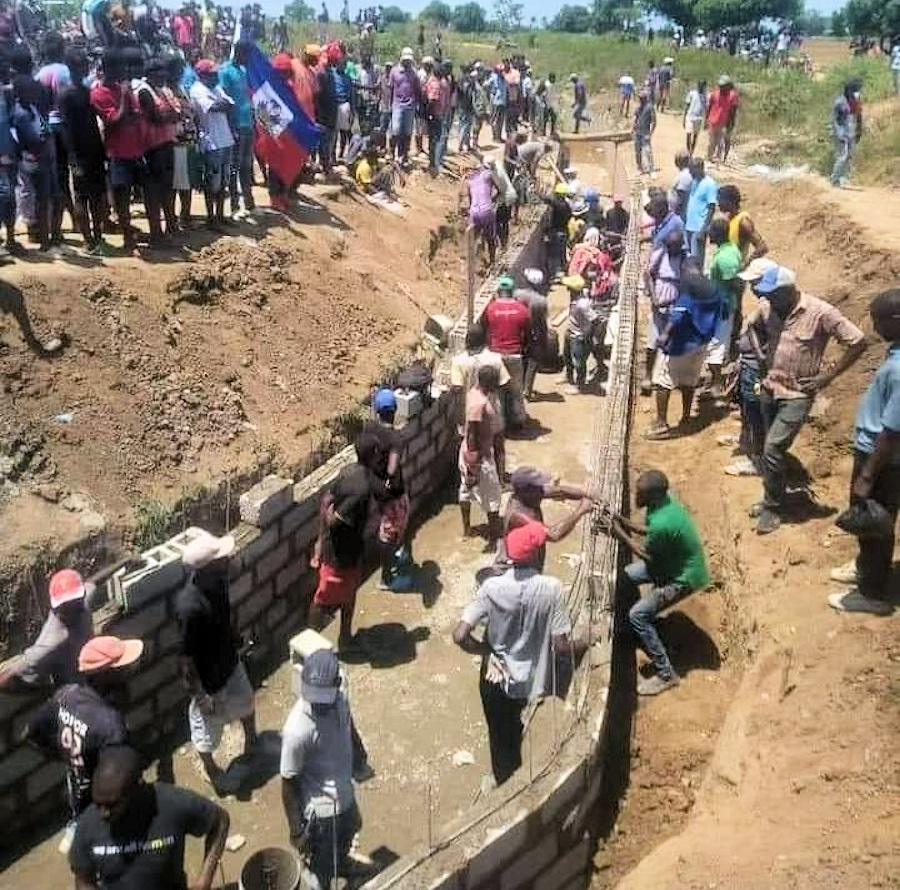
In a Sep. 12 interview with Haitian station Radio Mega, former Haitian Senator from the Northeast Department, Jean-Baptiste Bien-Aimé, said that Abinader is also trying to whip up ultra-nationalist support for his reelection bid in a presidential contest scheduled for May 19, 2024 with the Massacre River controversy.
The movement in Haiti’s Northeast is a great sign of hope, if Haitians are conscious and consistent, from all corners of the country. Abandoned workers who go to neighboring lands to sell their labor power and receive only contempt, repression, and humiliation in return can realize that they are a robust army, if they can organize themselves in the way they are building the Massacre River irrigation canal, they can count on their creative forces to change the country as well.
Support Orinoco Tribune team’s unique, amazing, and unmatched work!
5.5 years providing honest and responsible anti-imperialist information about the Global South!
66 months working for you, 18.5K posts published, 60 original pieces in the last 4 months, 21 YouTube interviews over the last 12 months, and much more to come!
Your donations make a big difference!
You must be logged in to post a comment.